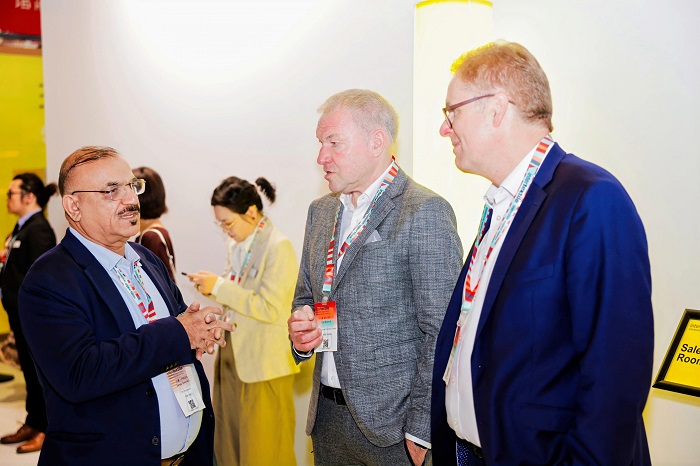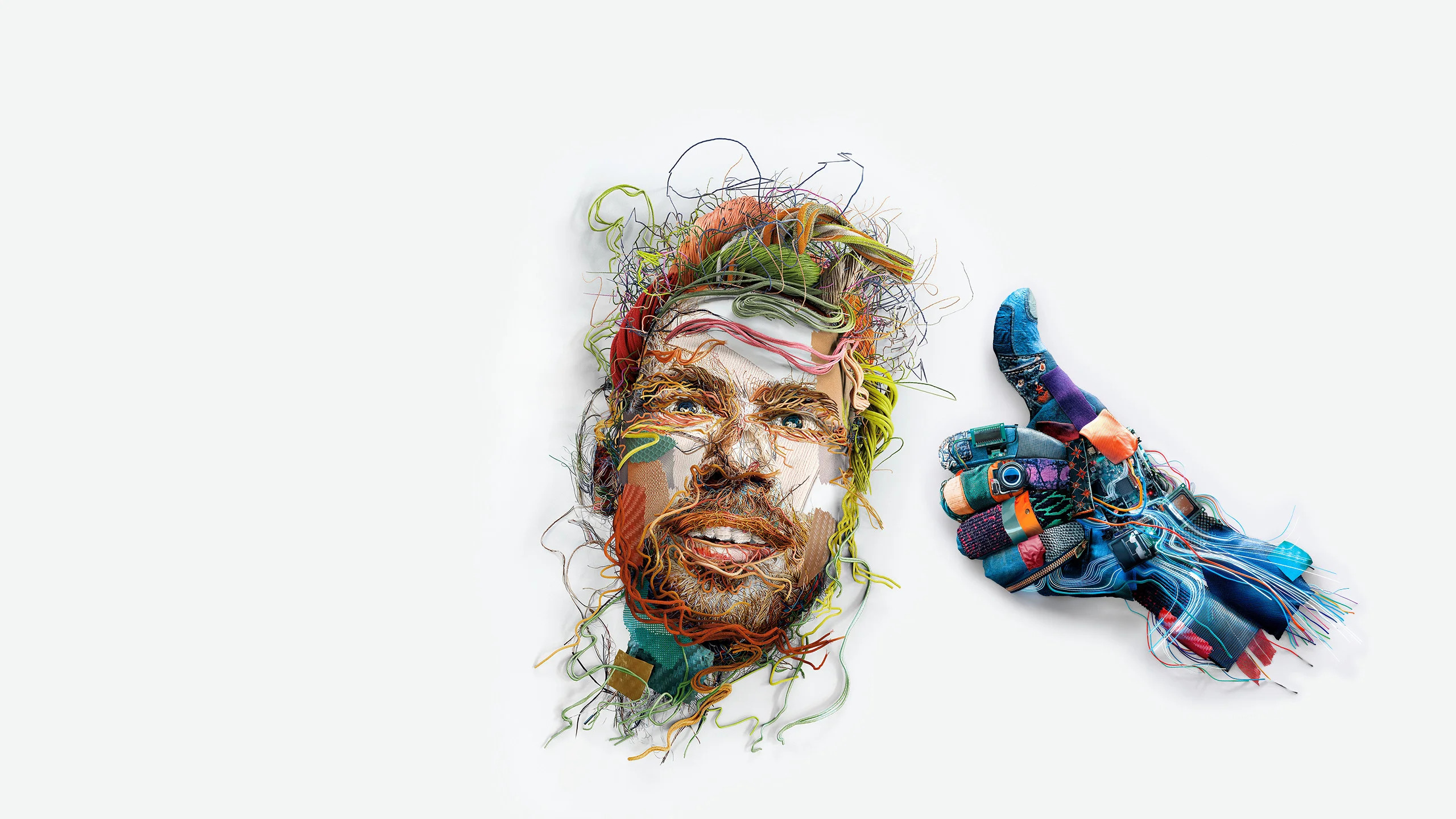FW
Reliance Industries (RIL) has introduced a new fabric known as R|Elan GreenGold.
Made from 100 per cent post-consumer PET bottles, R|Elan GreenGold brings together responsible sourcing, traceable systems, and chemistry-backed proof to ensure authenticity at every stage.
The initiative not only strengthens confidence in recycled textiles but also fosters a broader ecosystem of sustainability, fashion innovation, and circular design.
Unlike conventional recycled polyester, R|Elan GreenGold is backed by a brand-controlled ecosystem that ensures every bottle collected, flaked, and spun into fiber is accounted for. With reverse vending machines, trusted on-ground channels, and stringent vendor compliance on labor and environmental standards, Reliance has built end-to-end transparency from waste collection to final fabric.
One of the biggest gaps in sustainable textiles is proof of authenticity. R|Elan GreenGold bridges this gap through Isophthalic Acid (IPA) testing - a chemistry-based method that verifies the fibre’s true PET-bottle origin. Independent global-standard tests consistently validate GreenGold at ~1.8 per cent IPA content, offering brands irrefutable proof of recycled authenticity.
While celebrating the legacy of the late Giorgio Armani, the Milan Fashion Week this year is also showcasing the highly anticipated debuts of new designers at some of Italy's most iconic fashion houses.
Top brands like Prada, Dolce & Gabbana, Max Mara, Fendi, and Bottega Veneta are presenting their Spring/Summer 2026 women's collections at this year’s event. The most-watched debut is that of Georgian designer Demna at Gucci. After a successful decade at Balenciaga, Demna is tasked with revitalizing Gucci, which has faced a slowdown in sales. Instead of a traditional catwalk show, the brand is opting for a private presentation. Versace is also starting a new chapter as Dario Vitale unveils his first collection after taking over from Donatella Versace. The brand, recently acquired by Prada, will host an intimate event to showcase Vitale’s vision.
Other notable debuts this season include Louise Trotter at Bottega Veneta and Simone Bellotti at Jil Sander. These creative shake-ups are happening amidst a backdrop of global economic uncertainty and sluggish luxury sales, particularly in China. However, luxury analyst Luca Solca notes, brands are responding by offering newness to consumers, which is a crucial strategy during times of rising prices. This season, Milan is a testament to the industry's ability to evolve while honoring its foundational icons.
A brand-new women's activewear brand, NikeSkims is launching its debut collection on September 26. Designed to sculpt the body, this inaugural collection also delivers top-tier performance.
The new brand combines Nike's extensive knowledge of athletes with Skim’s focus on creating solutions-oriented apparel. Together, they offer a fresh aesthetic and a new ‘system of dress’ expertly crafted for the body, transitioning seamlessly from the studio to the gym and beyond.
To introduce the brand's ethos, NikeSkims has released a debut film titled ‘Bodies at Work,’ directed by filmmaker Janicza Bravo. The film features over 50 athletes from the Nike portfolio, including collegiate stars from USC and UCLA, alongside iconic figures like Serena Williams, Sha’Carri Richardson, Jordan Chiles, Chloe Kim, Madisen Skinner, Romane Dicko, Beatriz Hatz, and Nelly Korda. Kim Kardashian, Co-founder and Chief Creative Officer, Skims, also appears.
Born from a shared commitment to innovation, inclusivity, and distinctiveness, the first NikeSkims collection features seven distinct collections and 58 silhouettes, offering a system of dress with more than 10,000 ways to combine different looks. Each piece is crafted with meticulous attention to detail, providing a blend of style, function, and comfort that works equally well for workouts and daily wear.
The NikeSkims ‘system of dress’ takes a head-to-toe approach with layers that support and move with the body. This provides women with a complete wardrobe solution, from foundational bras and leggings to seasonal pieces and accessories, all created to help them look, feel, and perform their best.
Flattering lines, sculpting fabrics, and innovative materials in neutral colorways provide a wide range of styling options that perform as well as they look.
These styles are showcased in the brand's debut film and in campaign photography by Luis Alberto Rodriguez and Rob Woodcox, which highlight the power and beauty of the body in motion.
The launch builds on Nike's broader mission to expand its women's business, inspiring women and girls around the world to dream big and supporting them with industry-leading performance apparel and footwear.
In a powerful display of regional collaboration, representatives from five Southeast Asian nations came together at the Intertextile Shanghai Apparel Fabrics, Autumn Edition (September 2-4, 2025) to spotlight the immense investment opportunities within ASEAN's changing trade environment. The session, titled "Opportunities in ASEAN in Changing Trade Environment," brought together textile and apparel association leaders from Cambodia, Malaysia, Myanmar, Thailand, and Vietnam, along with key industry figures from China and Germany.

The forum's central message was clear: ASEAN is no longer just a manufacturing hub but a strategic, integrated ecosystem primed for growth, innovation, and sustainability. As global supply chains recalibrate amidst geopolitical tensions and rising costs, the region is positioning itself as a reliable and competitive alternative for global textile and apparel brands.
A shifting global landscape

The session was opened by Xu Yingxin, Vice President of the China National Textile and Apparel Council (CCPIT-TEX), who highlighted the growing trade relationship between China and ASEAN. "For four consecutive years, the East China Sea [ASEAN] has become China's largest trading partner in the textile industry," Xu said. He noted that in 2024, China and ASEAN's textile trade reached a total of $596.5 billion, a 6.7% growth rate. From 2013, China's textile industry has accumulated over $5.6 billion in direct investment in the region.

Olaf Schmidt, Vice President of Messe Frankfurt, echoed this sentiment, emphasizing the company's role in fostering these connections. He pointed to the launch of VIATT event in Vietnam in 2024, an exhibition aimed at connecting the entire textile supply chain, which has seen a 20% increase in exhibition space for its third edition.

Dato’ Shri Tan, a chief delegate from the ASEAN Federation of Textile Industries (AFTEX), presented a compelling case for ASEAN as a comprehensive ecosystem. He cited the region’s strategic location, providing access to 670 million consumers, competitive manufacturing costs, world-class infrastructure, and a business-friendly regulatory environment. Dato' Shri Tan urged companies to see the region as a gateway to new markets and a partner for innovation, especially in the areas of sustainability and technology.

Key Country Spotlights: Data and opportunities

Regina Leong, Permanent Secretary General of AFTEC, introduced and invited presentations from the represented nations offering a detailed look at their individual strengths, showcasing a diverse range of investment opportunities.
● Cambodia: As a ‘Least Developed Country (LDC)’, Cambodia offers significant trade preferences for exports to major developed countries. The country's textile and apparel sector employs nearly 1 million workers, with a competitive minimum wage of $100 per month. Exports in 2024 reached $13.7 billion, with the U.S. and EU being the largest markets. The government provides attractive tax incentives, including a three-year income tax exemption for new investors, and a commitment to not increase electricity prices. The country boasts a young workforce, with 60% of the population under 35.
● Malaysia:

With a population of 35 million and a projected GDP growth of 4-4.5% in 2025, Malaysia is positioning itself as a gateway to the broader Asia-Pacific market. The country has a long history in the textile industry, dating back to the 1970s, with a complete value chain from fiber to finished garments. While the textile industry contributes only 0.3% to its GDP, its political stability and advanced infrastructure make it an attractive location for high-quality, quick-delivery manufacturing. The total export in 2024 was $3.45 billion.
● Myanmar: Chin Foo from the Myanmar Garment Manufacturer Association (MGMA) highlighted the country's cost-effectiveness and skilled workforce. With a minimum wage of $100 per month, Myanmar offers a competitive pricing structure. The country's garment sector is a key driver of economic development, and while facing some challenges, it presents a new market opportunity for buyers looking to diversify their supply chains. The majority of factories work with the EU, with only 4% impacted by U.S. tariffs.
● Thailand:

Thailand's representative, Nutra Uttamapinant from the Federation of Thai Textile Industry, emphasized the country's dual economic structure, with strong manufacturing and a growing service and retail sector. Thailand is attracting investment in BCG (Bio-Circular-Green) and Digital Creative industries, with government incentives for new technologies like textile-to-textile recycling. The country is also making a push to attract skilled labor and long-term residents with its new "Smart Visa" and "Global Citizen Visa" programs. The top export markets for Thai textile clothing are the U.S., Japan, and Vietnam.
● Vietnam:

Nguyen Thi Tuyet Mai, Vice General Secretary, the representative from the Vietnam Textile & Apparel Association (VITAS), described Vietnam as a "dynamic and interesting nation." With a politically stable environment, a GDP growing at 5-6% annually, and a population of over 100 million, Vietnam is a major player. It is one of the world's top three garment exporters, with an annual turnover of over $40 billion. Vietnam's extensive network of Free Trade Agreements, including the CPTPP and EVFTA, provides significant tariff advantages. A critical challenge and opportunity remains the country's dependence on imported raw materials, making it a prime location for investment in green dyeing, fabric production, and recycling initiatives.
An integrated future
The forum concluded with a unified call to action. The ASEAN Federation of Textile Industries (AFTEX) and its member associations are committed to fostering deeper business-to-business partnerships and creating an integrated, digital value chain.
As Dato’ Shri Tan eloquently stated, "The future of textile is being written right here, right now. Join us, invest with us, grow with us." This collective vision of a sustainable, innovative, and collaborative future positions ASEAN as a formidable force in the global textile and apparel industry, ready to pioneer the next wave of transformation.
As the Intertextile Shanghai Apparel Fabrics - Autumn Edition drew to a close, Olaf Schmidt, Vice President of Textiles & Textile Technologies at Messe Frankfurt, addressed the media, highlighting the role of exhibitions as a crucial platform for the textile industry to navigate global trade uncertainties, particularly those stemming from tariffs and geopolitical shifts.

Exhibitions as a counter-strategy to uncertainty
Responding to questions about the impact of tariffs on exhibitor and buyer numbers, Schmidt acknowledged the widespread concern. Echoing a sentiment raised by the media, he emphasized that the exhibition's dynamic nature and its ability to connect global players offer a powerful counter-strategy.
Resilience and optimism drive the industry
Schmidt's perspective, however, was one of resilience and optimism. He noted that the discussion about tariffs is not a new topic, and companies have been forced to adapt for months. "Every morning you can look on the phone, something is changing and companies have to survive and say, 'okay, how can we do this and what should we do?'" he said.
He stressed that companies are embracing a proactive approach. "My discussion with many companies at our shows is that they say, 'okay, we have to be optimistic, we have to look for new markets, new opportunities.'" This is precisely where exhibitions prove their value. "I think an exhibition is exactly the right platform to generate new business," he affirmed.
Global platform for diversification
Schmidt also highlighted the strategic diversification of supply chains, a trend that began during the COVID-19 pandemic and is now being accelerated by trade tensions. He pointed to the growing presence of new participating countries, such as Ireland, the Netherlands, and Australia, underscoring the truly global nature of the platform.
"You can see this is really a global platform to make everybody see the new opportunities and try to find a solution," he stated. He added that Chinese companies are actively seeking to "make their production and their exports more, how to say, flexible and consistent," and are finding these solutions at trade shows.
Messe Frankfurt, a leading trade fair organizer, has seen its exhibitions become a crucial hub for the global textile industry as manufacturers and buyers grapple with the complexities of international trade and tariffs. Schmidt's message was clear: while trade tensions create challenges, they also drive innovation and a search for new opportunities. Exhibitions like Intertextile Shanghai Apparel Fabrics provide a vital space for the industry to come together, adapt, and build new, resilient business relationships.
A major apparel and footwear company, VF Corporation has sold its brand Dickies to a brand management firm, Bluestar Alliance for $600 million.
An iconic American brand known for its durable workwear, Dickies has been a cultural staple for over a century, popular in both workwear and streetwear circles. It's sold in 55 countries and is recognized for blending utility with style.
Bracken Darrell, CEO, VF Corporation, opines, the sale will help the company reduce its debt and improve its growth.
Joseph Gabbay, CEO, Bluestar Alliance, states, his company is committed to supporting its growth and unlocking its full value.
The deal is expected to be finalized by the end of 2025, pending the usual closing conditions and regulatory approvals.
The global digital textile printing market is projected to grow at 4 per cent CAGR from 2025-35 to reach a value of $5.6 billion by 2035.
As per a report by Future Markets Insights. this growth is likely to be fueled by the demand for faster production, customization, and sustainable practices that use less water and energy than traditional printing.
Consumers' preference for personalized and fashionable clothing is a major driver, with apparel accounting for over 38 per cent of the market. Brands are increasingly adopting this technology to enable just-in-time manufacturing and meet the demands of e-commerce.
Key technological advancements in print heads, inks, and software are improving quality and efficiency. Pigment-based inks are leading the way due to their versatility and eco-friendly nature, while polyester substrates remain the top choice for high-quality prints, particularly in sportswear and home textiles.
The market is growing steadily across the globe, with distinct regional drivers. The US market is projected to grow at a 3.8 per cent CAGR, thanks to the popularity of custom home décor. China, as the world's largest textile manufacturer, is set for a 5.4 per cent CAGR, while India is expected to see a 6.3 per cent CAGR, driven by its expanding apparel market and consumer spending.
The industry is made up of a tiered system of players. Tier I companies like Seiko Epson and Kornit Digital dominate with high production capacity and global reach. Tier II players such as Roland DGA focus on specific regions, and Tier III consists of smaller, local businesses that serve niche markets.
Major companies are investing in innovation to stay ahead. Recent developments include Roland DG's new eco-solvent inkjet printer, Seiko Epson's acquisition of Fiery, and ColorJet India's new high-volume printer.
With consumer demand for customization and sustainability continuing to rise, the digital textile printing market is poised for sustained growth. The focus on eco-friendly practices and technological innovation will redefine industry standards for quality and efficiency.
India has a strong domestic presence, making it’s the world’s biggest textile market with 1.4 million consumers, said Pabitra Margherita, Union Minister of State for External Affairs and Textiles at a convocation ceremony at National Institute of Fashion Technology (NIFT) in Bhopal. He made this statement amid concerns over steep tariffs imposed by the US on Indian textile products.
While the country consumes a large quantity of its own products, the government is now focusing on promoting ‘swadeshi,’ or locally made goods, he noted.
India has been a leader in textiles for centuries and continues to progress under Prime Minister Narendra Modi. It is a top exporter of apparel and other textile products, with 19 National Institute of Fashion Technology (NIFT) campuses playing a crucial role, he highlighted.
NIFT provides specialized courses and training to students who are expected to contribute to the textile industry's future, Margherita stated. These students are being encouraged to support local products first and help them gain a global presence, he added.
The popular retailer from Ireland, Primark is celebrating its 10th anniversary in the United States with plans for more growth.
A year ago, the company announced its first flagship store in Manhattan, located in Herald Square across from Penn Station. Primark recently also opened a new office in downtown Boston.
Kevin Tulip, President-US, Primark, says the company has been ‘very deliberate’ in its approach to the American market over the past decade. To introduce itself to American shoppers, last year Primark launched its first US brand campaign year called ‘That's So Primark.’ According to Michelle McEttrick, Global Chief Customer Officer, the brand aims to show budget-conscious consumers that they don't have to ‘sacrifice style.’
Founded in 1969, Primark's original mission was to provide affordable choices for everyone.\ The retailer also has a ‘Primark Cares’ strategy with several goals by 2030, including using only recycled or sustainably sourced materials for all its clothing, cutting carbon emissions in half, and working toward a living wage for its supply chain workers.
A denim manufacturer based in Pakistan, Artistic Milliners has acquired a majority stake in the iconic American denim company, Cone Denim from its parent company, Elevate Textiles.
The new combined entity will operate globally under the Cone Denim brand name, while Artistic Milliners' operations in Pakistan will continue to function independently. This acquisition is seen as a way to create a global powerhouse in the denim industry, combining Cone Denim's long-standing heritage with Artistic Milliners' innovation and global manufacturing network.
Steve Maggard, President, Cone Denim, will lead the new entity. The deal is expected to be finalized in Q1, FY26. This acquisition will allow the newly restructured Cone Denim to offer a ‘fully vertical, end-to-end’ solution, providing everything from premium denim fabric to finished garments. It will also expand its global footprint, with operations in North America, Asia, and potentially North Africa. Additionally, there are plans to revive US production capabilities.












